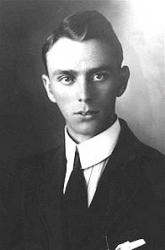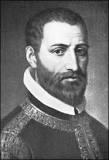Planning worship?
Check out our sister site, ZeteoSearch.org,
for 20+ additional resources related to your search.
- |
User Links
Person Results
Johann Nepomuk Hummel
1778 - 1837 Person Name: Johann Nepomuk Hummel (1778-1837) Composer of "RENOVATION" in Carmina Sanctorum, a selection of hymns and songs of praise with tunes
Johann Nepomuk Hummel
Jesse A. Barney

1889 - 1979 Person Name: J. Barney Composer of "NEALE" in Laudes Domini Jesse Albert Barney was the oldest of six children born to George Selwyn Barney and Cora Belle Martin. After attending local schools and the New Hampton, New Hampshire Academy, he attended Rochester Bible Training School, Rochester, New York (1910-12). He taught school in Orange, Grafton, West Rumney, and Wentworth, New Hampshire.
On September 29, 1916, he married Emilie B. Harris at West Rumney, New Hampshire. They had two children: Gerald Stanley Barney, born January 28, 1918; and Miriam Elaine Barney, born November 8, 1919. He became a minister, song writer, and musician. He also served two terms as a missionary in the Belgian Congo (now the Democratic Republic of the Congo) (1921-32).
From 1933-38, Barney toured with an evangelistic singing and musical group. On April 23, 1938, he lost his right arm while moving a piano. He then became a poultry farmer at Rumney Depot, New Hampshire. He served as a director of the New England Bible Conference, Rumney, New Hampshire, and Boston, Massachusetts. He was active in local government affairs, and was a representative to the New Hampshire General Court, Concord, New Hampshire.
© The Cyber Hymnal™. Used by permission. (www.hymntime.com/tch)
Jesse A. Barney
Jonathan C. Woodman
1813 - 1894 Person Name: J. C. Woodman Composer of "STATE STREET" in The New Laudes Domini
Jonathan C. Woodman
Charles Edward Pollock
1853 - 1928 Person Name: Chas. Edw. Pollock Composer of "EVENING TWILIGHT" in The Songs of Zion Charles Edward Pollock USA 1853-1928. Born at Newcastle, PA, he moved to Jefferson City, MO, when age 17. He was a cane maker for C W Allen. He also worked 20 years for the MO Pacific Railroad, as a depot clerk and later as Assistant Roadmaster. He was a musician and prolific songwriter, composing 5000+ songs, mostly used in Sunday school settings and church settings. He took little remuneration for his compositions, preferring they be freely used. He produced three songbooks: “Praises”, “Beauty of praise”, and “Waves of melody”. In 1886 he married Martha (Mattie) Jane Harris, and they had three children: Robert, Edward, and a daughter. He died in Merriam, KS.
John Perry
=================
Pollock, Charles Edward. (Jefferson City, Missouri, 1853-1924). Records of Jefferson City indicate the following:
1897 clerk at depot; residence at 106 Broadway (with Mildred Pollock)
1904-1905 cane maker for C. W. Allen
1908-1909 musician; residence at 106 Broadway (with wife Matty)
1912-1913 residence at St. Louis Road, east city limits
--Wilmer Swope, DNAH Archives
Note: not to be confused with Charles Edward Pollock (c.1871-1924).
Charles Edward Pollock
Jacob Arcadelt

1505 - 1568 Person Name: Jacques Arcadelt Composer of "ARCADELT" in Songs of Work and Worship Jacob Arcadelt born in the Netherlands towards the end of the 15th century, died in Paris. The story that he was a pupil of Joaquin Deprès is probably untrue. In 1540 he was admitted into the Pontifical Choir at Rome, and in 1555 (?) entered the service of Cardinal Charles of Lorraine, Duke of Guise, whom he followed to Paris. Arcadelt was on of the many Flemish composers who migrated to Italy; he helped to found the "great" Roman school, and was one of Palestrina's most distinguished forerunners. he united French delicacy of sentiment, Flemish mastery of musical form, and Italian culture in quite an exceptional way, and was at once one of the most important and prolific composers of his day. Together with Willaert and Verdelot, he was one of the founders of the madrigal. His first book of 53 madrigals (Venice, 1538) reached it sixteenth edition in 1617, and was followed by five other books. If in his church compositions Arcadelt's style is of almost heroic grandeur, and shows the most complete mastery over all the intricacies of counterpoint (albeit he seems to have despised the then popular "Netherlandish tricks"), in his Italian madrigals we discover perhaps the first dawn of the sentimental element in music. His French chansons, on the other hand, are perfect little cabinet-pieces of contrapuntal elaborateness. Notwithstanding the glorious musical epoch which followed close upon his death. Arcadelt's works were long looked upon with the greatest veneration' Frecobaldi wrote an organ piece on a them "del Signore Arcadelt," and even Liszt wrote a pianofote piece on an Ave Maria of his.
Cyclopedia of Music and Musicians by John Denison Camplin, Jr. and William Foster Apthorp (Charles Scribner’s Sons, 1888)
Jacob Arcadelt
Basil Harwood

1859 - 1949 Person Name: Basil Harwood (1859-) Composer of "COMBE MARTIN" in The Oxford Hymn Book Basil Harwood (11 April 1859 – 3 April 1949) was an English organist and composer.
Basil Harwood was born in Woodhouse, Gloucestershire (the second youngest of 12 children) on 11 April 1859. His mother died in 1867 when Basil was eight. His parents were Quakers but his elder sister Ada, on reaching 21 in 1867, converted to the Anglican Church. Basil was allowed to attend the ceremony at the Church of England in Almondsbury and this is where he was first drawn to organ music and choral singing. His father, Edward, remarried two years later in 1869 to a lady from an Anglican family. Basil was now sent to the Montpellier School in Weston-super-Mare for a year. In 1871, at 12 he was enrolled in Clevedon, the preparatory school for Charterhouse where he was first to formally study music.
He went up to Charterhouse in 1874 and left in 1876 having won a leaving Exhibition to Trinity College, Oxford where he initially studied Classics (1879) and Modern History (1880). He then studied for a further two years, 1881–1882, at the Leipzig Conservatory under Carl Reinecke and Salomon Jadassohn. It was here in 1882, Basil composed his first anthem for chorus and organ "O Saving Grace." He returned from Leipzig to realise that he had now passed the age limit to study music formally.
In 1883, Basil became organist of St. Barnabas Church, Pimlico completing his Sonata in C# Minor here in 1885, selling the copyright to the publisher Schott for one shilling a year or two later. After this success, he then moved to Ely Cathedral in 1887 where he wrote the bulk of Dithyramb, possibly his greatest organ work. His final appointment was as organist at Christ Church, Oxford and as precentor of Keble College, Oxford from 1892 to 1909. Whilst there he co-founded and conducted the Oxford Bach Choir which helped to earn him his degree as Doctor of Music. He conducted the Oxford Orchestral Association (1892–1898).
He was musical editor of the 1908 Oxford Hymn Book and Examiner for Musical Degrees (1900–1925).
During this time, he met and married Mabel Ada Jennings (the daughter of George Jennings) (who had become a pupil of his in 1896) at All Souls St. Marylebone, London (27 December 1899). Mabel had studied music herself, piano and composition, and was also a writer. She may well have composed lyrics for some of his lesser known tunes. At an advanced age she wrote a small volume of collected poems named Questing Soul.
He retired early at 50 (in 1909) after the death of his father, Edward Harwood, from whom he inherited the family estate of Woodhouse having outlived his seven older brothers. Soon after moving in he had a three manual chamber organ built in the library by Bishop & Sons of Ipswich (now in Minehead Parish Church), on which he promptly finished his Sonata in F# Minor. He continued to compose prolifically.
He was a keen walker, and named many of his hymn tunes after local places that he loved to visit, the most notable being the hymn tunes such as Tockington, Olveston, Almondsbury and Thornbury.
In 1936 advancing in years, he let the Woodhouse estate and moved to Bournemouth. Part of the estate, Woodhouse Down, was later sold to his contemporary Robert Baden-Powell who was two years older than he was and who had also attended Charterhouse School, and is used as a Scout Camp to this day.
In 1939, at eighty, he moved to London, taking a flat in Fleet Street. After a long life, he died on 3 April 1949, eight days short of his 90th birthday, at Courtfield Gardens in the Royal Borough of Kensington, London. A memorial service was held in St Paul's Cathedral on 22 April 1949. Mabel survived him, dying shortly before her 103rd birthday on 20 July 1974. He was survived by two sons; Major John Edward Godfrey Harwood (1900–1996) and Basil Antony Harwood (1903–1990) Senior Master of the Supreme Court, Q.B.D. and Queen's Remembrancer.
His remains are interred in St. Barnabas Church, Pimlico and marked by a plaque inset in floor of the chancel, close to where he would have stood to conduct the choir.
He composed cantatas, church music and works for the organ; his Service in A flat, the anthem O how Glorious and the hymn tunes LUCKINGTON ("Let all the world in every corner sing") and THORNBURY ("Thy hand O God has guided"), first used during a festival of the London Church Choir Association, remain in the Anglican repertory.
--en.wikipedia.org/wiki
Basil Harwood


 My Starred Hymns
My Starred Hymns

